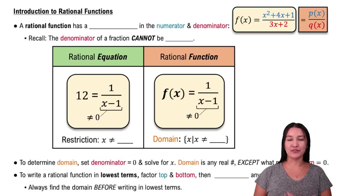Find the limits in Exercises 53–58. Write ∞ or −∞ where appropriate.
lim x/(x² − 1) as
d. x→−1⁻
 Verified step by step guidance
Verified step by step guidance Verified video answer for a similar problem:
Verified video answer for a similar problem:



 5:21m
5:21mMaster Finding Limits by Direct Substitution with a bite sized video explanation from Patrick
Start learning